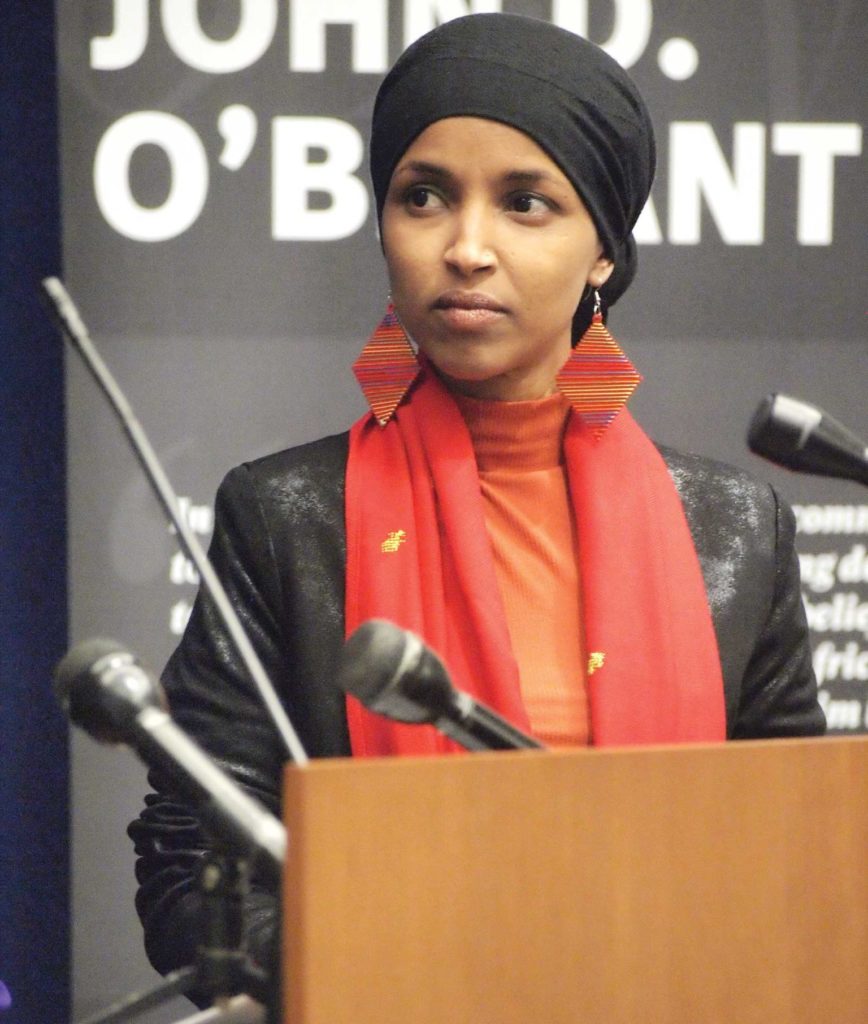GOP trafficking in anti-Muslim rhetoric
Massachusetts politicians say they, too, face hateful attacks

After video surfaced last month of U.S. Rep. Lauren Boebert, a Colorado Republican, making an anti-Muslim joke about her colleague Rep. Ilhan Omar, a Minnesota Democrat, elected officials and advocacy groups have taken the opportunity to speak out about ongoing xenophobia across the country, including in Massachusetts. The comments also underscore what some say is a growing trend of Republicans nationwide using hate speech to galvanize their base.
Boebert’s comments, which implied Omar was a suicide bomber, were caught on tape during an event in her district over the Thanksgiving holiday.
Response from top Republicans has been lukewarm. Republican Minority Leader Kevin McCarthy of California has refused to denounce or censure Boebert, despite direct calls by Omar and others to do so.
In Massachusetts, where Democrats dominate the political landscape, the picture is a little different. For one, Rep. Ayanna Pressley has introduced legislation calling for the removal of Boebert and condemnation of anti-Muslim bigotry.
“Muslims across the country are looking to Congress at this moment, watching to see if those they sent to represent their interests in Washington are going to stand up in the face of blatant, vicious Islamophobia,” Pressley said in a statement. “We owe it to them, and to every person who has been the recipient of harassment and verbal abuse based on their religion, race, gender, sexuality, or other identity, to stand up and show them that their votes to send us here mean something — that our values mean something and are worth defending.”
Pressley has been joined by more than 30 other legislators demanding Boebert’s removal.
On a more local scale, in November, Tania Fernandes Anderson became the first Muslim American to win a seat on the Boston City Council, and Etel Haxhiaj became the first Muslim American elected to the Worcester City Council. Also this year, Cambridge Mayor Sumbul Siddiqui was elected by her City Council colleagues to a second term after making history as the first-ever Muslim mayor of the city in 2020.
Anderson called her win “something different, and something that is intersectional,” while Haxhiaj referred to her election alongside two other immigrant candidates and a Black candidate for school board “historic.”
But despite growing diversity among elected officials in Massachusetts, the Bay State has not been exempt from right-wing hate speech both in and out of the political arena. During the District 7 City Council race, perennial candidate Roy Owens attempted to use anti-Muslim rhetoric against Anderson, who handily beat him with 73% of the vote. She said his comments were not unheard of to her and were based on ignorance.
“I’ve heard many, many stories, and you’re mocked on a daily basis, or you’re stared at or pointed at or laughed at on a daily basis in Boston,” Anderson said. “My opponent was telling people that I was going to spread Sharia law and he was calling me a hypocrite and all that stuff, but he’s working with very little resources.”
Both Haxhiaj and Siddiqui had similar stories to share about experiencing xenophobia, especially attacks conflating Islam to terrorism.
“I get the whole ‘Siddiqui, that’s associated with a known terrorist — are you related to one?’” the Cambridge Mayor told the Banner. “These types of things … you have to call it out because it’s all rooted in ignorance, bigotry, hate.”
Several studies in recent years have documented the problem. A 2019 MassLive article outlined officials’ concerns over hundreds of incidents reported to the Massachusetts Council on American-Islamic Relations, including at least one involving a child who received threatening letters calling her a terrorist. A 2021 CAIR report states 60% of Muslim youths surveyed in Massachusetts reported being mocked, verbally harassed or physically abused because of their Islamic faith.
Additionally, on top of overt attacks and language, political strategist Mohammed Missouri said, the use of coded language is prevalent in discourse surrounding international politics and localized anti-terrorism policies.
“In terms of overt Islamophobic statements or bigotry, I think that’s been rare in Massachusetts, at least in the last few years,” he said. “But as far as a lot of covert language, coded language, those kinds of things, I would say that it has been common, especially in the years after 9/11.”
Missouri went on to say, “From a policy level, I still think we need to get reconciliation commissions to truly learn how these different problems interrupt lives — surveillance, what kind of coded language is used in education [and] curriculum throughout the country.”
Anderson echoed this point, saying she would like to “bring more education to the city of Boston about Islamic values and what our needs are, or at least just educating folks on what this is, and why we cover, and why it shouldn’t be seen as something so horrible.”
Haxhiaj agreed.
“Whether it is homophobia, whether it’s anti-Black racism or any form of oppression, we all have a responsibility to call it out,” she said.
As for Boebert, it’s still unclear what consequences, if any, she might face moving forward.






